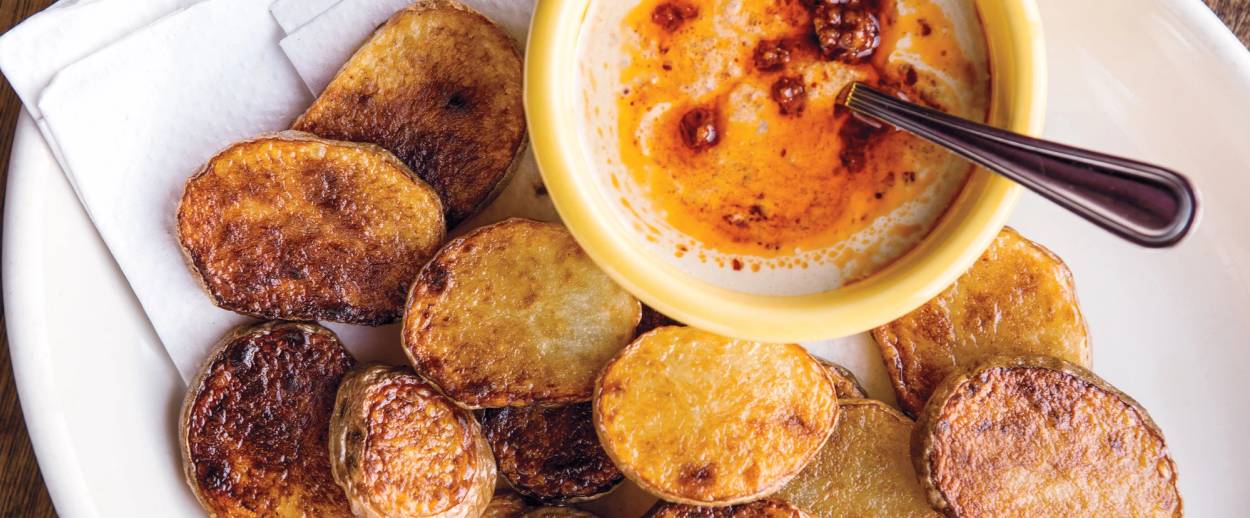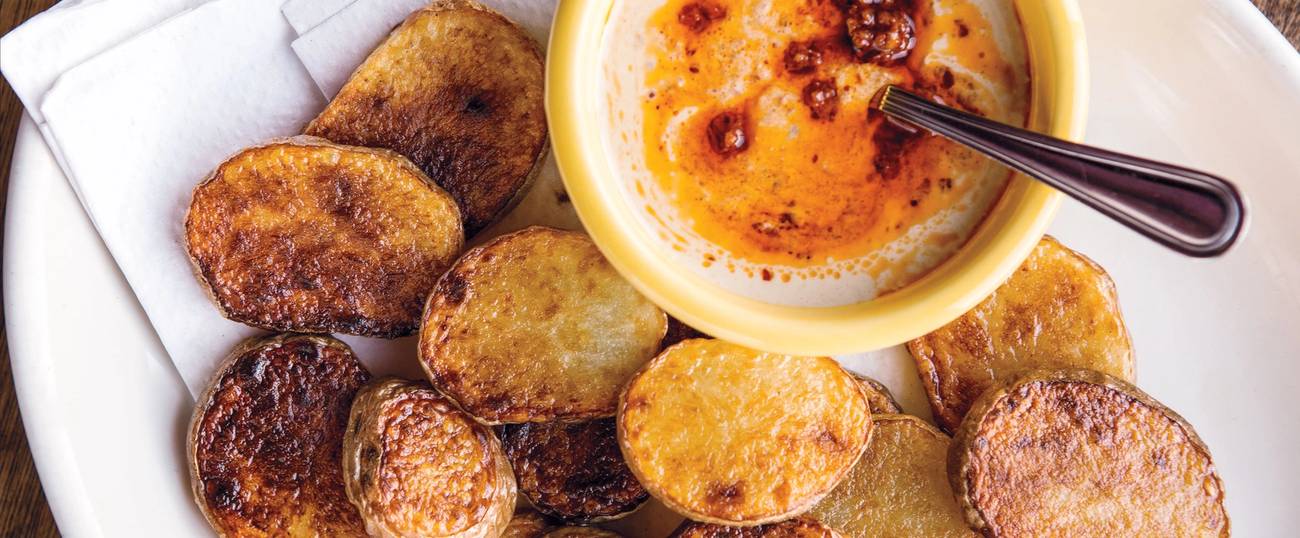Pride, Peoplehood, and Pitas
In an Israeli restaurant in Philadelphia, an epiphany about Jews, food, and history




When it comes to pleasing the palate, we gentlemen of nobler proportions lead short and tragic lives. We start out with wild abandon, chasing lamb in the Greek countryside, slurping the soupy entrails of fish outside Zhuhai, placing our purse and our paunch in the service of our passions. We dream of dishes as others do of fame or fortune, and we speak of the great chefs in the hushed tones other cultures reserve for the great mythic warriors of an earlier age. And then, one morning we feel it, the inevitable graying of our glut. We order that pain au chocolat, the one that made our hearts flutter each morning with buttery joy, and find no more magic in its folds. We read of the hottest new restaurant and no longer hear its siren song. The whole ecstatic project of delighting over meals strikes us as a fool’s errand. We turn inward, to simple home-cooked meals, contemplating mortality.
Or maybe it’s just me.
As I walked out of a perfectly fine dinner in a perfectly fine Manhattan restaurant recently, I felt the Scrooge stirring within; when my wife asked me what I thought of the meal, all I could muster was an icy “bah, humbug.” With December almost at an end, I found myself, to paraphrase that wisest of Christmas sages, a year older but not an hors d’oeuvre richer. With the odious foodie culture fetishizing the process without much feel for the essence, the whole scene, it seemed to me, was corrupted by the same deficiency in imagination that has ravaged the art world, where blunt conceptual temerity is lavishly praised—look! A shark in formaldehyde!—while the Old Masters are relegated to dark alcoves in lightly visited museums. Next year, I vowed, as one costly and disappointing meal turned to another and yet another, I’ll bid my gluttony farewell.
And then I walked into Michael Solomonov’s Zahav. I’d heard great things about the Philadelphia restaurant, a bastion of contemporary Israeli cuisine. Friends who share my maniacal passion for meat swore that you won’t find a better shishlik this side of the Schuylkill. I walked in with high expectations, and, as is sometimes my habit when intrigued by the offerings on the page, ordered pretty much the entire menu.
If I were a restaurant critic—a hapless sap expected to share his most intimate desires with others in common, technical terms—I would tell you how impossibly great the seasoning was on the beef and lamb kofte, how perfectly the schmaltz glazed the chicken, how delightful the arak marshmallow that topped the terrific coffee custard. But the feeling I had while eating at Solomonov’s table quickly transcended the roof of my mouth and traveled to the core of my soul; he wasn’t only serving me a stellar meal but telling me, with his lamb and his tahini and his fluffy laffas, a story I needed to hear, one that was about much more than food.
It was a story about home, about my homeland and his, about Israel. Into its national collective kitchen, the Romanians brought their spicy kebabs and the Bulgarians their peppers and their kashkaval cheese; the Arabs the chickpea and the Poles the pickled herring; the Iraqis the kibbeh and the Yemenites the jahnun. What to make of this cornucopia? To the pedants and the bores, it is an invitation to insist on purity and authenticity; dare sprinkle some sriracha on your shawarma, say, and you’ll hear a long and dispiriting lecture. Then there are the hacks, for whom creativity must be made obvious by melting together as many ingredients and traditions as possible, the final flavors be damned. Both approaches are common, and both represent ways of being insecure about who Israelis really are.
Solomonov tells a different story. It’s a much simpler one. He cooks with the confidence of a man for whom this culinary diversity is a bounty, not an abstraction or a complication. He is guided not by some convoluted idea but by a real and searing passion for this food. He can be sophisticated and complex—try the Brussels sprouts baba ganoush that comes with the lovely sirloin shishlik—or straightforward, depending on the dish or the mood. He is engaged in a labor of love—no small triumph in a field that increasingly champions noisy distractions and empty theatrics—and it’s his love that gives all these distinct traditions and their disparate ingredients a coherence that feels not only natural but inevitable. Duck hearts with celery root, pear, pine nuts, and sumac? Of course; could it really be any different?
Such capacity for ordering the world, if you think about it, has always been our engine of survival. Faced with realities that were frequently too daunting to take, Jews persevered in large part because they had the capacity to tell better stories, intricate tales that were so powerful they eclipsed the grim reality from which they sprang. Those Jews sitting by the rivers of various Babylons had always the Promised Land to ponder, and every benighted age could always be illuminated by the spark of divine election, telling us that we had a purpose greater than mere suffering. Whatever else these stories were, they were confident, passionate, and joyous, the only kind of story truly worth retelling again and again for millennia.
We need these stories still. With the discourse of self-doubt ascendant, with so many of us parsing the fine points of our identities and finding problems aplenty but hardly any gratitude or grace or love, we could do much worse than recommit ourselves to that same simple tale that has kept us intact for for so long, the one about a people coming together on its fertile land to eat, drink, and be merry. And a meal at Zahav tells this story better than a dozen Birthright trips. It is Israel at its best—visceral and playful and spicy and welcoming. To a generation reared on digital platforms and fed the manna of theory, maybe all it takes to rekindle the ancient spirit is a bite of some divine kebab.
***
Like this article? Sign up for our Daily Digest to get Tablet Magazine’s new content in your inbox each morning.
Liel Leibovitz is editor-at-large for Tablet Magazine and a host of its weekly culture podcast Unorthodox and daily Talmud podcast Take One. He is the editor of Zionism: The Tablet Guide.